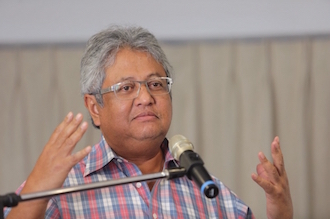Do you want to be a gynaecologist?
Giving birth is a complicated and possibly dangerous process, so a mother should have a choice about who delivers her baby.
Zaid Ibrahim, The Star
THE job of a legislator is to make policies that benefit the public; in democratic countries, legislators are publicly entrusted with this task because they have been given a mandate by the voters who elected them.
The democratic rationale is that if legislators make bad decisions or policies, the people can vote them out in the next election.
In Malaysia, fatwa are not made by elected representatives and yet they have the force of law.
But for some reason, the Government’s legal advisers made a ruling 15 years ago that fatwa are a form of subsidiary legislation that have the force of law.
Usually, subsidiary legislation is meant to regulate processes or provide guidelines that are relevant to the objectives of the principle legislation. Subsidiary legislation in and of itself is not meant to create substantive law or offences, which is why it is called “subsidiary”.
There is certainly nothing subsidiary about a fatwa, which can classify you and me as “liberals” and therefore deviationists, just as it can classify members of a political party to be the worst kind of infidel.
A fatwa in Malaysia can cover the earth and sky in terms of scope and depth: it is so far-reaching that it can curtail our basic rights and liberties.
In Malaysia, I do not think all the Malay Rulers are personally involved in the issuance of fatwa in most cases, but I will stand corrected if this is incorrect. The usual practice in Islamic history has been for fatwa to be issued only upon request of the caliph, and muftis do not give their opinions as and when they like or depending on their mood.
Historically, the caliph would ask for such an opinion on a particular matter of public interest only when there were already a multiplicity of views permeating society, so many in fact that there was a risk of confusion and unrest.
There are no caliphs now in the Muslim world today, yet some muftis issue fatwa on request by people with political interest, and the particular fatwa is law, binding on Muslims and indirectly has influenced public policies in the country.
For example, Deputy Health Minister Datuk Seri Dr Hilmi Yahya recently announced the Government’s intention to make it mandatory that only women doctors should deliver babies in public hospitals.
On the face of it, this is a bad policy because making something mandatory should be limited to extreme situations – such as wearing seat belts in cars to reduce the risk of death and injury in motor accidents. There are coherent and good reasons for wearing seat belts but we have not been given any such reason why only women obstetricians should be allowed to deliver babies.
Giving birth is a complicated process and can be dangerous, so it is important that the patient is comfortable with the person attending to her needs. If a prospective mother has confidence in a particular gynaecologist who is a man, she should not be denied her choice.
Of course there are women who are not comfortable being attended to by male obstetricians and they should certainly be provided access to women doctors as well.
This option is already available in all hospitals, so why is it necessary to make it mandatory for all women?
Is it because some holy men in a government department totally unrelated to medicine and childcare have decreed that no male doctors should be involved because a woman must not expose her aurat during childbirth?
I trust that the minister will not let the private fetishes of self-appointed guardians of morality dictate what kind of medical care is “appropriate” for the public.
Unless there is strong medical evidence (confirmed by respected medical research) that says a woman obstetrician is better at the job than a man, I think it is totally unacceptable that a women-only policy be adopted. Also, what will happen to all the male doctors currently studying to be gynaecologists and obstetricians and hoping to serve in the government medical service?
Let’s say that we’ve implemented the policy: some male medical graduates who were initially interested in obstetrics and gynaecology will now opt for other specialisations because they will have no opportunity to work in public hospitals.
Let’s say they now specialise in surgery – but who can guarantee that some future government policy won’t bar them from operating on women for the same reason that they will catch sight of a woman’s private parts?
Will we then be obliged to implement gender segregation in all fields of medicine where the aurat might be exposed because some holy men think it’s a good idea?
I am sorry, Mr Deputy Minister and his boss, the Minister. There are other more urgent matters we all can think of that can make medical care better in the country. Why do we need such a silly idea to even surface?
In any event, it is in the public interest that the Government explains the policy fully so that women can provide their input.
Surely since women are the ones who have to endure childbirth and face all the complications that go with it, their opinion of this policy is absolutely crucial – and, after all, public consultation is the first step towards formulating good policy.
Editor’s note: Deputy Health Minister Datuk Seri Dr Hilmi Yahya has later clarified his statement, saying that mothers-to-be could choose their preferred female specialists to attend to them once the country had achieved an adequate number of female obstetrics and gynaecology specialists.
Former de facto Law Minister Datuk Zaid Ibrahim ([email protected]) is now a legal consultant.


